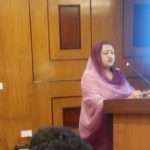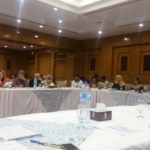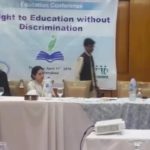ISLAMABAD, Pakistan: The Centre for Social Justice (CSJ) in collaboration with the Peoples Commission for Minorities Rights (PCMR) organized a Conference in Islamabad on Thursday, which urged the federal and provincial governments to undertake effective measures to ensure the ‘Right to Education without Discrimination’.
The Conference Resolution, unanimously adopted, called for, among other steps, the removal of hate material from educational curricula; educational quota for minorities in higher education institutes, and expansion of subject options available to minority students vis-à-vis religious education to enforce their right to study their own religion as guaranteed under Article 22 of the Constitution of Pakistan, 1973.
Prominent academics, policy experts and civil society representatives participated in the Conference as speakers and guests including, Dr. A.H. Nayyar, Ms. Tahira Abdullah, Mr. Ahmed Saleem, Ms. Fatima Atif, Ms. Asiya Nasirand Mr. Peter Jacob (Executive Director – CSJ) who highlighted the major challenges existing at the institutional and individuals levels that continue to violate the fundamental rights of minority citizens/communities in Pakistan.
Ms. Asiya Nasir (former MNA) stated: ‘“I hope to see Christian youth emerge as a talented and productive segment of the population that plays a contributory role in nation’s progress. Unfortunately, due to discrimination, Christian students are often deprived of their fundamental right to education, limiting their life opportunities. This stark inequality in terms of their access to educational and professional opportunities further alienates young Christians from mainstream society.”
Ms. Tahira Abdullah, prominent human rights activist, said; “There is an urgent need to include progressive non-Muslims, women, and education experts in the federal and provincial Curriculum and Textbook Boards as curriculum developers and textbook writers”.
Mr. Peter Jacob emphasized on the need to develop sustainable action strategies aimed at creating a pluralistic, open-minded and tolerant society where members of different faith-based communities are able to peacefully co-exist and flourish.
The Conference shall be followed up by a series of consultative dialogues & meetings aimed at increasing awareness regarding Supreme Court’s landmark 2014 judgment on protection of minority rights as well as to bring forth authentic information to assist the government in monitoring the implementation status of specific directives of the Supreme Court vis-à-vis education sector reforms and minority rights in the country. To this end, a Working Group of education policy experts has been constituted to monitor the performance of federal and provincial government agencies in this regard.







